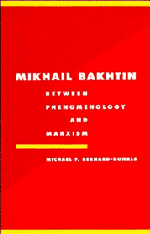Book contents
- Frontmatter
- Contents
- Preface
- Acknowledgments
- Abbreviations
- 1 Problems with Formalism
- 2 Neo-Kantianism and Bakhtin's phenomenology
- 3 Reception and hermeneutics: the search for ideology
- 4 The Marxist texts
- 5 Science and ideology
- 6 Science, praxis, and change
- 7 Bakhtin, the problem of knowledge, and literary studies
- Bibliography
- Index
1 - Problems with Formalism
Published online by Cambridge University Press: 03 May 2011
- Frontmatter
- Contents
- Preface
- Acknowledgments
- Abbreviations
- 1 Problems with Formalism
- 2 Neo-Kantianism and Bakhtin's phenomenology
- 3 Reception and hermeneutics: the search for ideology
- 4 The Marxist texts
- 5 Science and ideology
- 6 Science, praxis, and change
- 7 Bakhtin, the problem of knowledge, and literary studies
- Bibliography
- Index
Summary
“Bakhtin and the Formalists were made for each other.” This is the way Katerina Clark and Michael Holquist begin the chapter entitled “The Formalists” in their biography of Bakhtin (Mikhail Bakhtin 186). The gist of the comment, borne out by the rest of the chapter and in fact by a good part of that book, is that the Formalists allowed Bakhtin to formulate the ideas that he had worked on up to that point in his career. Others more substantially tie Bakhtin's work to Russian Formalism. Although Victor Erlich does not tie Bakhtin specifically to Formalism as it was developed in the Soviet Union in the 1920s, he nevertheless says in the Introduction to his Russian Formalism that, were he “writing this book today, [he] would undoubtedly pause before the achievement of Mikhail Bakhtin…” whose work “attests to a strong affinity for the mature phase of Formalist theorizing” (10). And Gary Saul Morson, in “The Heresiarch of the Meta,” suggests that “to leave Bachtin [sic] out of an account of Russian Formalism is profoundly to misunderstand the nature and objectives of the movement…” (408). Finally, Tony Bennett devotes a good portion of his Formalism and Marxism to pursuing the link between Bakhtin and his circle to both Formalism and to Marxism.
- Type
- Chapter
- Information
- Mikhail BakhtinBetween Phenomenology and Marxism, pp. 1 - 17Publisher: Cambridge University PressPrint publication year: 1995

